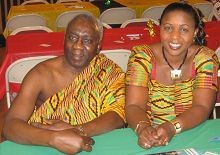After 14 years of civil war, President Ellen Johnson Sirleaf’s government struggles to complete a gigantic reconstruction task.
Liberian government officials and members of the private sector called on their fellow citizens abroad to return home and help rebuild their country.
Speaking at a government-sponsored investment forum in Bloomington, Minn., on Sep. 8, the leaders said that more than ever their country needed the expertise of Liberians in the Diaspora.
“Liberia is open for business again,” said Richard Tolbert, the chairman of the National Investment Commission of Liberia.
Tolbert advised Liberians to identify small investment opportunities, which he said could greatly contribute toward the reconstruction of the country.
“Do your homework. Start something small and later move into bigger ventures,” Tolbert said.
Liberians have been involved in rebuilding their country since 2003, the year that marked the end of a 14-year civil war that left more than 200,000 people dead and sent hundreds of thousands more fleeing. Many Liberians resettled abroad and have been reluctant to return. The election of President Ellen Johnson Sirleaf in 2005 renewed hope, but her government has been struggling with limited funds.
In recent years African governments have come to realize that investments by their citizens abroad can help ease financial strain, and the Liberian government appears to be following suit.
The one-day Liberian Private Sector Investment Symposium, which was organized by the Government of Liberia through its Embassy in Washington, D.C., brought together approximately 200 Liberian professionals and potential investors.
The Liberian Ambassador to the United States, Charles Minor, said the symposium was intended to showcase what Liberia had to offer and to attract investors to the country.
More than a dozen speakers gave presentations showcasing investment opportunities in housing, transportation, agriculture, forestry, energy development, mining and natural resources investment in Liberia. Speakers also discussed health, education, Information Technology and financing options for investment.
Ben Mortimer of Air McPhillips and Gayah Fahnbulleh of Transworld International Consortium discussed housing and transportation. They noted that there are business opportunities in ground, sea and air transportation services in Liberia.
Mortimer said there was need to develop air transport in Liberia. Fahnbulleh emphasized the need to construct many low-cost homes in the country. He said there was also a shortage of hotels and encouraged Liberians to invest in that sector.
Dr. Eugene Shannon, the minister for Land, Mines and Energy, and Sunny Nyemah, a Liberian businessman in Minnesota, focused on agriculture and forestry. They discussed the possibilities for commercial farming such as rice, palm oil, coffee, cocoa, rubber and the development of a domestic agro processing industry.
The former managing director of the Liberia Electricity Corporation and presidential advisor on energy, Christopher Neyor, presented a paper on power and electricity development in Liberia. Neyor said electricity was important for the country and that the government had prioritized the rebuilding of the damaged hydroelectric power plant – which was destroyed during the civil war – for the production of electricity. He said it would cost between $150 and $200 million to rehabilitate the industry.
Other investment opportunities exist in the education sector, said social activist, Dr. Mariah Seton. Seton pointed out that providing access to education, retaining students and creating relevant curriculum were major challenges in Liberia’s educational development. The worsening poverty level in the country, inadequate funding and the enormous destruction of the country’s educational facilities and infrastructure were to blame for the state of education, she said. Seton underscored the importance of primary education in people’s lives.
“For many young people, primary education is the one chance they will have to acquire the basic literacy, numeracy and essential life skills to enhance their chances of a sustainable livelihood,” Seton said.
The president of the Organization of Liberians in Minnesota, Martha Sinoe, congratulated the organizers and said the forum was a success. She called on Liberians to take advantage of the many opportunities to invest in Liberia.
The Liberian government plans to hold similar conventions in Pleasanton, Calif., Atlanta, Ga., Providence, R.I., and Washington, D.C., according to Minor, the ambassador.
About Robert Sayon Morris
Robert Sayon Morris is a Senior Staff Writer with Mshale. He reports on general assignments. Before moving to the United States, he practiced journalism in his native Liberia.







